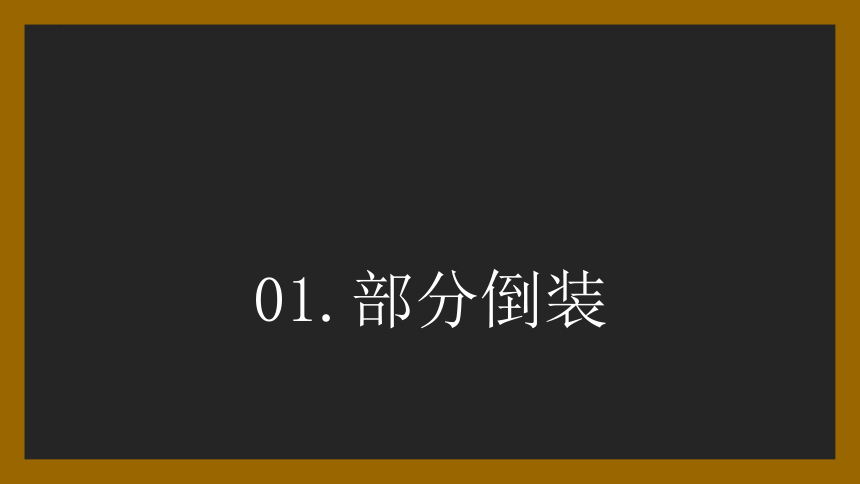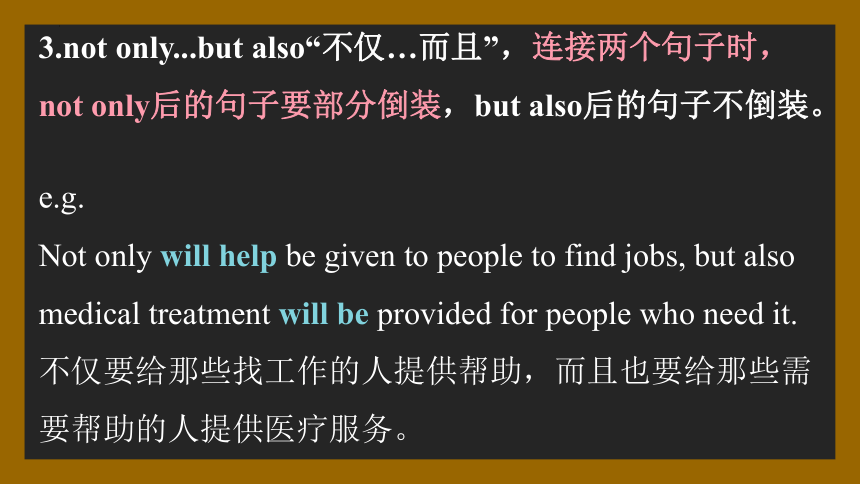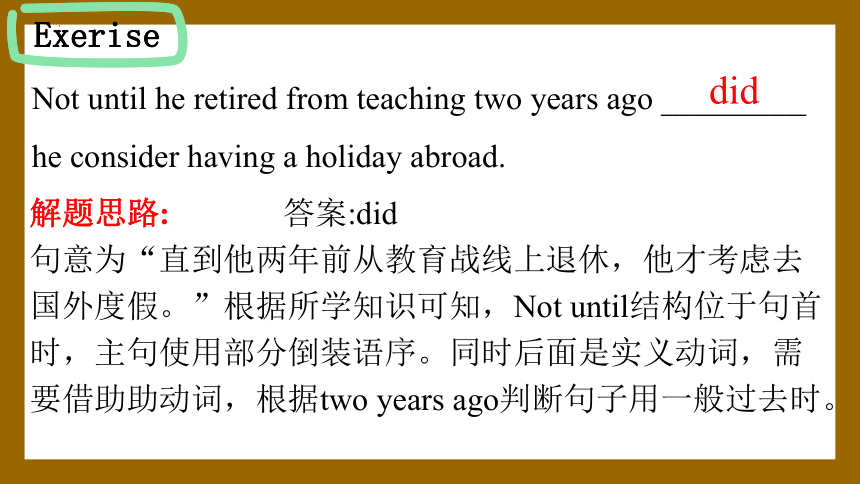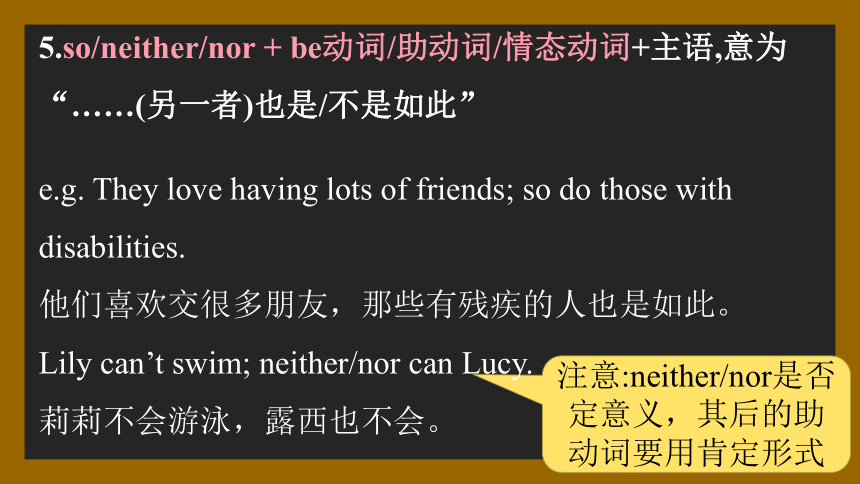2022届高考英语专题复习倒装句课件(38张)
文档属性
| 名称 | 2022届高考英语专题复习倒装句课件(38张) |

|
|
| 格式 | pptx | ||
| 文件大小 | 226.2KB | ||
| 资源类型 | 教案 | ||
| 版本资源 | 通用版 | ||
| 科目 | 英语 | ||
| 更新时间 | 2022-04-03 00:00:00 | ||
图片预览












文档简介
(共38张PPT)
倒装句
01.部分倒装
02.全部倒装
03.形式倒装
CONTENTS
01.部分倒装
部分倒装
指将该句中谓语的一部分如系动词、助动词、情态动词移到主语的前面,谓语的其他部分仍保留在主语后面。
含义:
not 不 hardly 几乎不 at no time 决不 on no account
决不
never 从不 seldom 很少 scarcely 几乎不 barely
几乎不
little 很少 nowhere 没有地方 by no means 决不 on no condition
无论如何也不
rarely 几乎不 in no way 一点也不 in no case 决不 under no circumstances
无论如何也不
1.具有否定意义或半否定意义的副词和含有否定词的短语用于句首时,句子需要部分倒装。
常用的这类词或词组有:
Not a single mistake did he make.
他一个错也没犯
Nowhere else in the world can there be such a quiet, beautiful place.
世界上没有别的地方能这样安静,这样美丽。
By no means can you smoke in a gas station.
你决不能在加油站吸烟。
2.only修饰副词、介词短语或状语从句,且放在句首时,句子需要部分倒装。
e.g. Only after the war did he learn the sad news.
我的笔记 在战后他才知道那个悲伤的消息。
Only when he returned did we find out the truth.
当他回来的时候,我们才查明了真相。
only修饰状语从句时,是主句倒装,从句不可倒装呦!
注意:
判断正误:
Only can he answer the question.
Only he can answer the question.
只有他能回答这个问题。
only修饰主语时,句子不可倒装。
3.not only...but also“不仅…而且”,连接两个句子时,not only后的句子要部分倒装,but also后的句子不倒装。
e.g.
Not only will help be given to people to find jobs, but also medical treatment will be provided for people who need it.
不仅要给那些找工作的人提供帮助,而且也要给那些需要帮助的人提供医疗服务。
4.not until …“直到……才……”,作状语或引导状语从句置于句首时,主句要用部分倒装。
e.g.
Not until 1911was the first kind of the vitamins identified.
直到1911年才发现了第一种维生素。
Not until he returned did we have supper.
直到他回来我们才吃晚饭。
Exerise
Not until he retired from teaching two years ago _________ he consider having a holiday abroad.
解题思路: 答案:did
句意为“直到他两年前从教育战线上退休,他才考虑去国外度假。”根据所学知识可知,Not until结构位于句首时,主句使用部分倒装语序。同时后面是实义动词,需要借助助动词,根据two years ago判断句子用一般过去时。
did
注意:neither/nor是否定意义,其后的助动词要用肯定形式
5.so/neither/nor + be动词/助动词/情态动词+主语,意为“……(另一者)也是/不是如此”
e.g. They love having lots of friends; so do those with disabilities.
他们喜欢交很多朋友,那些有残疾的人也是如此。
Lily can’t swim; neither/nor can Lucy.
莉莉不会游泳,露西也不会。
注意:
若是对前面内容的肯定或附加,不可使用倒装形式。
e.g.
-Tom failed to pass the exam.
-So he did.
(意为“汤姆确实没通过考试”。)
此结构中的名词如果是不可数名词,则不用冠词。
6.如此……以至于……”
So t adj./adv.+部分倒装 +that.
Such(+a/an)+adj. + n.+部分倒装+that
So clearly does he speak English that he can always make himself understood.
他说英语如此清晰以至于别人都听得懂。
Such a fine day is it that we'd like to play outside.
天气这么好,我们想去外面玩。
7. Neither + 部分倒装,nor+ 部分倒装
意为“既不…,也不…
e.g
Neither do I know it, nor do I care about it.
我不知道,也不关心。
8.Hardly+部分倒装...when..., no sooner +部分倒装...than
“一……就……”
e g.
Hardly/Scarcely had he heard the news when he began to cry.
他一听到这个消息就哭了。
No sooner had I reached home than it began to rain.
我一到家就开始下雨了。
9.虚拟语气的if条件句中,如果含有were, should,had,则可以省略if,同时把 were, should, had 移至主语前面,构成部分倒装。
e.g. Were you in my position, you would do the same.
如果你在我的位置,你也会这么做。
Should it rain tomorrow, we would put off the meeting.
如果明天下雨,我们就推迟会议。
02.全部倒装
全部倒装
指将该句中谓语动词完全放在主语之前。
含义:
1.表示方式、方位的副词或介词短语,如here, there, up, down, i n, away, off, out, in the room, on the wall 等,置于句首,且主语是名词时,需要完全倒装。
e.g.
Out rushed the children.
孩子们冲了出去。
South of the river lies a small factory.
一个小型工厂坐落在河的南岸
2.such置于句首时,需要完全倒装,语序为“Such+be+主语”
e.g. Such was Albert Einstein, a simple man and the 20th century’s greatest scientist.
这就是阿尔伯特·爱因斯坦,一个朴实的人,也是20世纪最伟大的科学家。
3.形容词或分词位于句首时,需要完全倒装,语序为“表语+系动词+主语”
e.g. Seated on the grass are a group of students.
坐在草地上的是一群学生。
Present at the meeting were several famous scientists from all子 over the world.
出席会议的是几位来自世界各地的著名的科学家。
1.She opened it and let out a deep breath. Inside it ______(be) two sharp knives.
解题思路: 答案:were
本题解题关键点为Inside it 和knives。句子用完全倒装语序,主语是 two sharp knives,是复数形式,结合上句的opened 可知填 were。
were
2.Out _________(rush) the children when the fire burst forth.
rushed
解题思路: 答案:rushed
本题解题关键点为Out和the children。根据所学知识可知,当表示方位或地点的副词或介词短语放于句首时,句子应用完全倒装。由句意“火灾突然发生时,孩子们冲了出来。”及“burst”可知,应用过去时态。
03.形式倒装
形式倒装
只是要把强调的内容放在句首,主谓不倒装。
含义:
1.as/though(尽管)引导的让步状语从句的倒装
将需要强调的表语(名词、形容词)、部分谓语动词、副词提前到as/though 的前面,主谓语序不变。
e.g. Tired though he was, he still went on with his work.
他尽管累,却依然继续工作。
Search as they would here and there, they could find nothing in the room.
尽管到处寻找,但他们在房间里找不到任何东西。
Hard as I studied, I could not catch up with them.
我虽然努力学习,但赶不上他们。
如果是单数名词或形容词的最高 级作表语,提前的时候不再用冠词。
注意:
Strong man as/though he is, he has been severely put to the test during the past few weeks.
尽管他很坚强,但在过去的几个星期里,他受到了 严峻的考验。
2.what/how 引导的感叹句
对名词或名词短语感叹时,用what引导;对形容词或副词感叹时,用 how 引导。
eg:
What an interesting talk they had!
他们进行了一次多么有趣的谈话呀!
How interesting their talk is!
他们的谈话多么有趣啊!
2.1. 对名词或名词短语感叹时,用what引导
(1)What a/an+(形容词)+单数名词+谓语
(2)What+(形容词)+复数名词+谓语
(3)What+(形容词)+不可数名词+谓语
2.2. 对形容词或副词感叹时,用 how 引导。
(1)How+形容词+主语+谓语!
(2)How+副词+主语+谓语!
(3)How+主语+动词!
(4)How+ many, much, few, little+ 名词+主语+谓语!
3 The+ 比较级…the+比较级……
表示“越……就越………”
e.g. The higher the ground is, the thinner air becomes.
离地面越高,空气就越稀薄.
4.whatever t n.和however + adj./adv.引导的让步状语从句
e.g. However hard the battle is, we should have a strong belief that we'll fight the virus eventually and everything will be all right.
无论战斗多么艰难,我们都应该坚信,我们最终会战胜病毒,一切都会好起来。
1.Strange _____________seems.it is true.
解题思路:
本题解题关键在于掌握as/though引导的从句表示让步关系。观察题干可以看出,做表语的strange提前了。根据strange和true的逻辑关系可知,前后应该是让步关系,又是倒装语序,所以填as/though。句意为“虽然看起来很奇怪,但这是真的。”
though/as
2.In recent years travel agencies have succeeded in selling us the idea that the further we go, the__________(good) our holiday will be.
解题思路:
本题解题关键点为“the+比较级, the+比较级”结构
better
Thanks for
your listening!
倒装句
01.部分倒装
02.全部倒装
03.形式倒装
CONTENTS
01.部分倒装
部分倒装
指将该句中谓语的一部分如系动词、助动词、情态动词移到主语的前面,谓语的其他部分仍保留在主语后面。
含义:
not 不 hardly 几乎不 at no time 决不 on no account
决不
never 从不 seldom 很少 scarcely 几乎不 barely
几乎不
little 很少 nowhere 没有地方 by no means 决不 on no condition
无论如何也不
rarely 几乎不 in no way 一点也不 in no case 决不 under no circumstances
无论如何也不
1.具有否定意义或半否定意义的副词和含有否定词的短语用于句首时,句子需要部分倒装。
常用的这类词或词组有:
Not a single mistake did he make.
他一个错也没犯
Nowhere else in the world can there be such a quiet, beautiful place.
世界上没有别的地方能这样安静,这样美丽。
By no means can you smoke in a gas station.
你决不能在加油站吸烟。
2.only修饰副词、介词短语或状语从句,且放在句首时,句子需要部分倒装。
e.g. Only after the war did he learn the sad news.
我的笔记 在战后他才知道那个悲伤的消息。
Only when he returned did we find out the truth.
当他回来的时候,我们才查明了真相。
only修饰状语从句时,是主句倒装,从句不可倒装呦!
注意:
判断正误:
Only can he answer the question.
Only he can answer the question.
只有他能回答这个问题。
only修饰主语时,句子不可倒装。
3.not only...but also“不仅…而且”,连接两个句子时,not only后的句子要部分倒装,but also后的句子不倒装。
e.g.
Not only will help be given to people to find jobs, but also medical treatment will be provided for people who need it.
不仅要给那些找工作的人提供帮助,而且也要给那些需要帮助的人提供医疗服务。
4.not until …“直到……才……”,作状语或引导状语从句置于句首时,主句要用部分倒装。
e.g.
Not until 1911was the first kind of the vitamins identified.
直到1911年才发现了第一种维生素。
Not until he returned did we have supper.
直到他回来我们才吃晚饭。
Exerise
Not until he retired from teaching two years ago _________ he consider having a holiday abroad.
解题思路: 答案:did
句意为“直到他两年前从教育战线上退休,他才考虑去国外度假。”根据所学知识可知,Not until结构位于句首时,主句使用部分倒装语序。同时后面是实义动词,需要借助助动词,根据two years ago判断句子用一般过去时。
did
注意:neither/nor是否定意义,其后的助动词要用肯定形式
5.so/neither/nor + be动词/助动词/情态动词+主语,意为“……(另一者)也是/不是如此”
e.g. They love having lots of friends; so do those with disabilities.
他们喜欢交很多朋友,那些有残疾的人也是如此。
Lily can’t swim; neither/nor can Lucy.
莉莉不会游泳,露西也不会。
注意:
若是对前面内容的肯定或附加,不可使用倒装形式。
e.g.
-Tom failed to pass the exam.
-So he did.
(意为“汤姆确实没通过考试”。)
此结构中的名词如果是不可数名词,则不用冠词。
6.如此……以至于……”
So t adj./adv.+部分倒装 +that.
Such(+a/an)+adj. + n.+部分倒装+that
So clearly does he speak English that he can always make himself understood.
他说英语如此清晰以至于别人都听得懂。
Such a fine day is it that we'd like to play outside.
天气这么好,我们想去外面玩。
7. Neither + 部分倒装,nor+ 部分倒装
意为“既不…,也不…
e.g
Neither do I know it, nor do I care about it.
我不知道,也不关心。
8.Hardly+部分倒装...when..., no sooner +部分倒装...than
“一……就……”
e g.
Hardly/Scarcely had he heard the news when he began to cry.
他一听到这个消息就哭了。
No sooner had I reached home than it began to rain.
我一到家就开始下雨了。
9.虚拟语气的if条件句中,如果含有were, should,had,则可以省略if,同时把 were, should, had 移至主语前面,构成部分倒装。
e.g. Were you in my position, you would do the same.
如果你在我的位置,你也会这么做。
Should it rain tomorrow, we would put off the meeting.
如果明天下雨,我们就推迟会议。
02.全部倒装
全部倒装
指将该句中谓语动词完全放在主语之前。
含义:
1.表示方式、方位的副词或介词短语,如here, there, up, down, i n, away, off, out, in the room, on the wall 等,置于句首,且主语是名词时,需要完全倒装。
e.g.
Out rushed the children.
孩子们冲了出去。
South of the river lies a small factory.
一个小型工厂坐落在河的南岸
2.such置于句首时,需要完全倒装,语序为“Such+be+主语”
e.g. Such was Albert Einstein, a simple man and the 20th century’s greatest scientist.
这就是阿尔伯特·爱因斯坦,一个朴实的人,也是20世纪最伟大的科学家。
3.形容词或分词位于句首时,需要完全倒装,语序为“表语+系动词+主语”
e.g. Seated on the grass are a group of students.
坐在草地上的是一群学生。
Present at the meeting were several famous scientists from all子 over the world.
出席会议的是几位来自世界各地的著名的科学家。
1.She opened it and let out a deep breath. Inside it ______(be) two sharp knives.
解题思路: 答案:were
本题解题关键点为Inside it 和knives。句子用完全倒装语序,主语是 two sharp knives,是复数形式,结合上句的opened 可知填 were。
were
2.Out _________(rush) the children when the fire burst forth.
rushed
解题思路: 答案:rushed
本题解题关键点为Out和the children。根据所学知识可知,当表示方位或地点的副词或介词短语放于句首时,句子应用完全倒装。由句意“火灾突然发生时,孩子们冲了出来。”及“burst”可知,应用过去时态。
03.形式倒装
形式倒装
只是要把强调的内容放在句首,主谓不倒装。
含义:
1.as/though(尽管)引导的让步状语从句的倒装
将需要强调的表语(名词、形容词)、部分谓语动词、副词提前到as/though 的前面,主谓语序不变。
e.g. Tired though he was, he still went on with his work.
他尽管累,却依然继续工作。
Search as they would here and there, they could find nothing in the room.
尽管到处寻找,但他们在房间里找不到任何东西。
Hard as I studied, I could not catch up with them.
我虽然努力学习,但赶不上他们。
如果是单数名词或形容词的最高 级作表语,提前的时候不再用冠词。
注意:
Strong man as/though he is, he has been severely put to the test during the past few weeks.
尽管他很坚强,但在过去的几个星期里,他受到了 严峻的考验。
2.what/how 引导的感叹句
对名词或名词短语感叹时,用what引导;对形容词或副词感叹时,用 how 引导。
eg:
What an interesting talk they had!
他们进行了一次多么有趣的谈话呀!
How interesting their talk is!
他们的谈话多么有趣啊!
2.1. 对名词或名词短语感叹时,用what引导
(1)What a/an+(形容词)+单数名词+谓语
(2)What+(形容词)+复数名词+谓语
(3)What+(形容词)+不可数名词+谓语
2.2. 对形容词或副词感叹时,用 how 引导。
(1)How+形容词+主语+谓语!
(2)How+副词+主语+谓语!
(3)How+主语+动词!
(4)How+ many, much, few, little+ 名词+主语+谓语!
3 The+ 比较级…the+比较级……
表示“越……就越………”
e.g. The higher the ground is, the thinner air becomes.
离地面越高,空气就越稀薄.
4.whatever t n.和however + adj./adv.引导的让步状语从句
e.g. However hard the battle is, we should have a strong belief that we'll fight the virus eventually and everything will be all right.
无论战斗多么艰难,我们都应该坚信,我们最终会战胜病毒,一切都会好起来。
1.Strange _____________seems.it is true.
解题思路:
本题解题关键在于掌握as/though引导的从句表示让步关系。观察题干可以看出,做表语的strange提前了。根据strange和true的逻辑关系可知,前后应该是让步关系,又是倒装语序,所以填as/though。句意为“虽然看起来很奇怪,但这是真的。”
though/as
2.In recent years travel agencies have succeeded in selling us the idea that the further we go, the__________(good) our holiday will be.
解题思路:
本题解题关键点为“the+比较级, the+比较级”结构
better
Thanks for
your listening!
